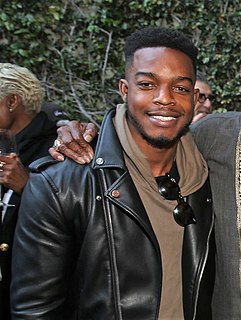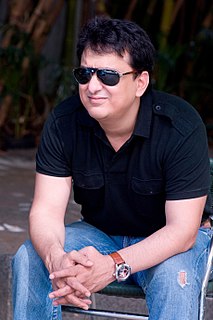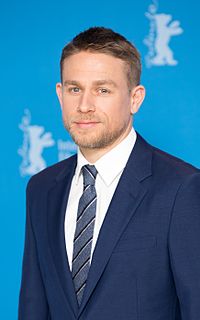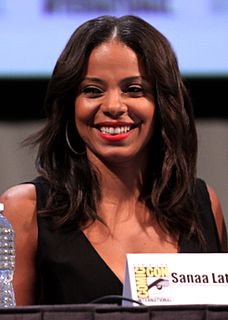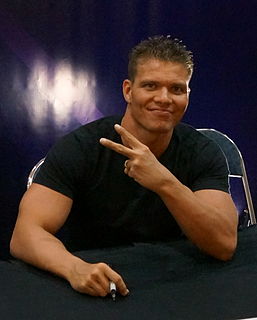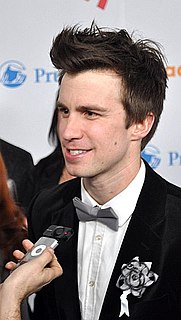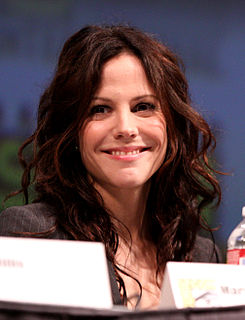A Quote by Stephan James
I knew [Jesse Owens'] name, but I really didn't remember what it is he had done, so I felt like I had to get refreshed. So I read the script and I realized like, wow, this is an incredible human being. I told my manager, however I had to do it, let me see the director; I got to play him.
Related Quotes
After I read the story of 'Dangal' and before the film released, I called director Nitish Tiwari asking him if he had any good script. He told me to wait for some time. So we had three-four sittings, and this film, 'Chhichhore,' came to him. The film did not have superstars, but I felt that this is the script that needs to be told.
I think it took me seven years before I got the script for 'Frozen River.' That's the movie I had been looking for my whole career. When I read that, I knew I had to shoot that movie - that it'd be a game-changer. It was one of those scripts where I read it, and I was like, 'This movie could get into Sundance.'
One of the first speaking roles I had was in a film called 'Svengali', with Peter O'Toole and Elizabeth Ashley. I was a waiter, and I had about three lines. And I was ready! I had been around people like that, and I knew they were just actors. All the work I had done, it was all there, and I felt like I knew all the mechanics.
Right before I got 'Sons of Anarchy,' I actually quit acting for 18 months and didn't read a single script, and I wrote a film. I felt like I needed to do something that I had control over, as an artist, and also just do something where I felt like I had some control over my life, as just a human, out in the world.
Right before I got 'Sons of Anarchy,' I actually quit acting for 18 months and didnt read a single script, and I wrote a film. I felt like I needed to do something that I had control over, as an artist, and also just do something where I felt like I had some control over my life, as just a human, out in the world.
I just couldn't believe that it [Into the Forest script] had fallen into my lap, because I felt so incredibly connected to my character, and I understood her, and I really...I haven't had that feeling about a script since I had read Thirteen or The Wrestler when I was just like, "No one else can do this." I just feel so passionate about it.
I remember my son wanted to go to bed with his cowboy boots on, and we had this fight for like an hour. Then I realized that the only good reason I had for him not to do it is because I didn't want him to. There was really no other reason. And finally I said, "OK, fine." It was a great victory for me, because I realized it doesn't really matter.
Like the guy I was dating. White, liberal, educated. I went to meet his family and I think that they probably didn't know they had a problem with it until he walked in with me. And they definitely had issues. Mom had issues with it. Could not, didn't want to see her son. And I don't think she had anything against me. But it was about her son bringing me home. And I felt that for the first time. I was like, 'Wow, that's deep.' It's really simple: I don't fit their picture.
I was really proud to be in that show. I will never forget. I got the script to 'Millie,' and I'm flipping through the script and saying, 'Boy, I have some lines... I have a big song.' I was 25 years old and had never been on Broadway before. I got to the end of the script, and I was really nervous and excited. I realized I had a lot to do.
I had read the Animal House script, and by hook and crook, I finally got an audition. It was a great one. John Landis followed me out into the hallway afterward and said, "I've never done this before, but you've got the job. Now don't tell anyone!" I've never had a director do that. It was one of those Hollywood-dream-come-true stories. They saw me as a surfer or cowboy, not a preppie, but someone begged and borrowed me an audition, and I went in and got it.
Jesse Owens had to be a very strong person. There were a lot of protests, but I think that he knew, despite the pressure on both sides, the pressure to go and the pressure not to go, he had to do it for himself. Unknowingly, he changed the world and broke so many barriers by doing so, by being a leader.
I really like the director [for Weeds]. I don't know if you've spoken to him yet but he's really, really intelligent. He was just really kind when I met him and nice and really told me why I should play the part...and kind of really didn't argue with him. He's just really, really smart and assembled these really great people. I felt like he really knows how to enlist his intelligence to get you - I don't know - he's really hard to argue with I find.
When I read the script [of Good Kill], it read like a science fiction film. And Andrew [writer/director Andrew Niccol] is known for sci-fi. But when I spoke to him, he said this picture was 100% factual, which blew my mind. I realized then how little I knew about the drone program. And I felt that, if I knew so little about it, there must be others who should be educated about what's going on.
